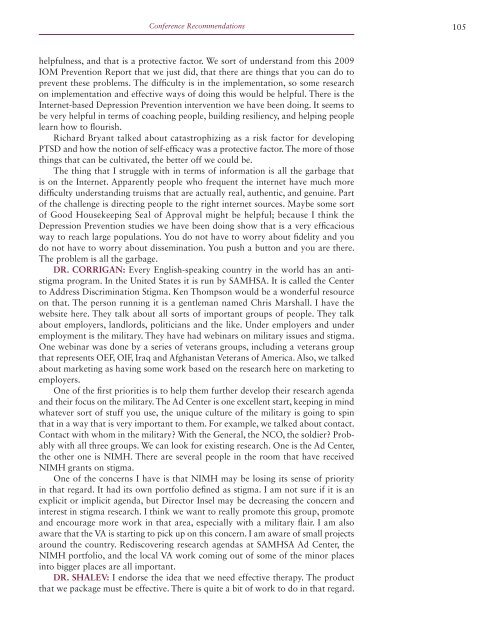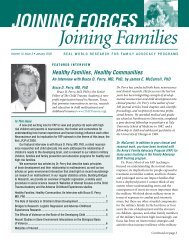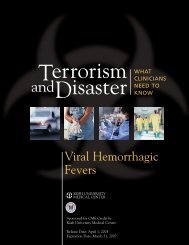stigma and barriers to care - Uniformed Services University of the ...
stigma and barriers to care - Uniformed Services University of the ...
stigma and barriers to care - Uniformed Services University of the ...
You also want an ePaper? Increase the reach of your titles
YUMPU automatically turns print PDFs into web optimized ePapers that Google loves.
Conference Recommendations 105<br />
helpfulness, <strong>and</strong> that is a protective fac<strong>to</strong>r. We sort <strong>of</strong> underst<strong>and</strong> from this 2009<br />
IOM Prevention Report that we just did, that <strong>the</strong>re are things that you can do <strong>to</strong><br />
prevent <strong>the</strong>se problems. The difficulty is in <strong>the</strong> implementation, so some research<br />
on implementation <strong>and</strong> effective ways <strong>of</strong> doing this would be helpful. There is <strong>the</strong><br />
Internet-based Depression Prevention intervention we have been doing. It seems <strong>to</strong><br />
be very helpful in terms <strong>of</strong> coaching people, building resiliency, <strong>and</strong> helping people<br />
learn how <strong>to</strong> flourish.<br />
Richard Bryant talked about catastrophizing as a risk fac<strong>to</strong>r for developing<br />
PTSD <strong>and</strong> how <strong>the</strong> notion <strong>of</strong> self-efficacy was a protective fac<strong>to</strong>r. The more <strong>of</strong> those<br />
things that can be cultivated, <strong>the</strong> better <strong>of</strong>f we could be.<br />
The thing that I struggle with in terms <strong>of</strong> information is all <strong>the</strong> garbage that<br />
is on <strong>the</strong> Internet. Apparently people who frequent <strong>the</strong> internet have much more<br />
difficulty underst<strong>and</strong>ing truisms that are actually real, au<strong>the</strong>ntic, <strong>and</strong> genuine. Part<br />
<strong>of</strong> <strong>the</strong> challenge is directing people <strong>to</strong> <strong>the</strong> right internet sources. Maybe some sort<br />
<strong>of</strong> Good Housekeeping Seal <strong>of</strong> Approval might be helpful; because I think <strong>the</strong><br />
Depression Prevention studies we have been doing show that is a very efficacious<br />
way <strong>to</strong> reach large populations. You do not have <strong>to</strong> worry about fidelity <strong>and</strong> you<br />
do not have <strong>to</strong> worry about dissemination. You push a but<strong>to</strong>n <strong>and</strong> you are <strong>the</strong>re.<br />
The problem is all <strong>the</strong> garbage.<br />
DR. CORRIGAN: Every English-speaking country in <strong>the</strong> world has an anti<strong>stigma</strong><br />
program. In <strong>the</strong> United States it is run by SAMHSA. It is called <strong>the</strong> Center<br />
<strong>to</strong> Address Discrimination Stigma. Ken Thompson would be a wonderful resource<br />
on that. The person running it is a gentleman named Chris Marshall. I have <strong>the</strong><br />
website here. They talk about all sorts <strong>of</strong> important groups <strong>of</strong> people. They talk<br />
about employers, l<strong>and</strong>lords, politicians <strong>and</strong> <strong>the</strong> like. Under employers <strong>and</strong> under<br />
employment is <strong>the</strong> military. They have had webinars on military issues <strong>and</strong> <strong>stigma</strong>.<br />
One webinar was done by a series <strong>of</strong> veterans groups, including a veterans group<br />
that represents OEF, OIF, Iraq <strong>and</strong> Afghanistan Veterans <strong>of</strong> America. Also, we talked<br />
about marketing as having some work based on <strong>the</strong> research here on marketing <strong>to</strong><br />
employers.<br />
One <strong>of</strong> <strong>the</strong> first priorities is <strong>to</strong> help <strong>the</strong>m fur<strong>the</strong>r develop <strong>the</strong>ir research agenda<br />
<strong>and</strong> <strong>the</strong>ir focus on <strong>the</strong> military. The Ad Center is one excellent start, keeping in mind<br />
whatever sort <strong>of</strong> stuff you use, <strong>the</strong> unique culture <strong>of</strong> <strong>the</strong> military is going <strong>to</strong> spin<br />
that in a way that is very important <strong>to</strong> <strong>the</strong>m. For example, we talked about contact.<br />
Contact with whom in <strong>the</strong> military With <strong>the</strong> General, <strong>the</strong> NCO, <strong>the</strong> soldier Probably<br />
with all three groups. We can look for existing research. One is <strong>the</strong> Ad Center,<br />
<strong>the</strong> o<strong>the</strong>r one is NIMH. There are several people in <strong>the</strong> room that have received<br />
NIMH grants on <strong>stigma</strong>.<br />
One <strong>of</strong> <strong>the</strong> concerns I have is that NIMH may be losing its sense <strong>of</strong> priority<br />
in that regard. It had its own portfolio defined as <strong>stigma</strong>. I am not sure if it is an<br />
explicit or implicit agenda, but Direc<strong>to</strong>r Insel may be decreasing <strong>the</strong> concern <strong>and</strong><br />
interest in <strong>stigma</strong> research. I think we want <strong>to</strong> really promote this group, promote<br />
<strong>and</strong> encourage more work in that area, especially with a military flair. I am also<br />
aware that <strong>the</strong> VA is starting <strong>to</strong> pick up on this concern. I am aware <strong>of</strong> small projects<br />
around <strong>the</strong> country. Rediscovering research agendas at SAMHSA Ad Center, <strong>the</strong><br />
NIMH portfolio, <strong>and</strong> <strong>the</strong> local VA work coming out <strong>of</strong> some <strong>of</strong> <strong>the</strong> minor places<br />
in<strong>to</strong> bigger places are all important.<br />
DR. SHALEV: I endorse <strong>the</strong> idea that we need effective <strong>the</strong>rapy. The product<br />
that we package must be effective. There is quite a bit <strong>of</strong> work <strong>to</strong> do in that regard.




